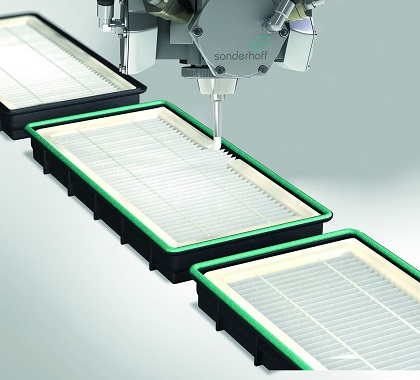At booth R9 in hall 11.1, Sonderhoff will demonstrate a filter application live using the dispensing cell SMART-M. For this purpose, the system uses the mixing head to meter a Fermadur adhesive sealant onto the insides of an MDF filter frame over its entire surface. The pleated filter placed in the filter frame is sealed airtight on all sides. Thanks to the foamed cell structure of the filter adhesive and thus lower density up to 50% less material can be used.
Sonderhoff supports the leading manufacturers of filter systems with a wide range of 2-component foam gaskets, adhesives and potting compounds. The 2C material systems based on polyurethane (PU) or silicone cover the application range from vacuum cleaners to automotive filters to air filters for HVAC systems. The PU systems meet the quality requirements of VDI 6022 for use in filters in ventilation and air conditioning systems (RLT) in hospitals and for chip production in cleanrooms. Filter frames are sealed with sealing foams or gels by Sonderhoff according to the groove and tongue principle, so that no unfiltered air can pass the filter and into the interior spaces.
The polyurethane-based Sonderhoff filter systems offer features such as low-emission for low VOC (volatile organic compounds) in clean rooms, anti-fungicidal or anti-bacterial properties or flame retardance according to UL 94 HF-1 for sealing foams or UL 94 V-0 for adhesive sealants. Temperature-resistant silicone foams from Fermasil product systems are used to seal air filters in the engine compartment at high temperatures.
Low-emission foam gaskets for sealing air filters
Sonderhoff's polyurethane foam gaskets Fermapor K31 Low Emission, mainly used in car air conditioning systems, not only ensure a perfect fit of the filter on the air intake duct. The low-emission polyurethane foam sealing systems primarily avoid the pollution of the driver's cab with VOC emissions. They meet, for example, Daimler's specification DBL 5452-13, which specifies as target values for VOC emissions 100 μg and for fogging behavior 250 μg per gram of polyurethane.
Anti-bacterial foam gaskets for the sealing of HVAC Systems
The anti-fungicidal and anti-bacterial properties of Sonderhoff's filter adhesives and foam gaskets prevent microorganisms and mold from sticking to the seals of air conditioning filter frames or to the car's fresh air intake. This is confirmed by the test results of the Institute for Air Hygiene (ILH Berlin), who have examined the corresponding Sonderhoff products for their resistance to fungi and bacteria in accordance with DIN EN ISO 846 (Determination of the effect of microorganisms on plastics). Special additives in the material formulation provide effective protection against infestation with harmful microorganisms, which represent a potential risk of allergies.
Precise sealing and gluing of filters
It is not only the right choice of raw materials that determines the consistently high quality of the sealing and gluing of filters, but above all the safety and accuracy of the production plant. This is what the mixing and dosing systems from Sonderhoff stand for, ensuring a precise application process of the materials to the components. With the Formed In-Place (FIP) sealing technology established in the filter industry, the material systems are automatically applied directly to the filter components. The 2-component reaction materials cure at room temperature and thereafter the parts can then be processed quickly.
Compact dispensing cell SMART-M flexibly adaptable
The SMART-M dispensing cell has a modular design. This makes it flexibly adaptable to different production concepts. At the Sonderhoff trade fair stand, the cell is loaded with parts in a user-friendly manner via a rotary indexing table. The loading and working positions change 180 degrees in a cycle of 1.5 seconds.
With dimensions of 1200 x 1700 x 2400 mm (width x depth x height), the SMART-M needs only a minimum of floor space. The 3-axis linear robot of the dispensing cell moves components in a travel range of up to 500 x 600 mm (width x depth) and up to a maximum part height of 250 mm. In component radii an acceleration of up to 5 m / s² is possible.
Conclusion for the customers
Whether in vacuum cleaners, automobiles, air conditioning or industrial plants - the filters must be well glued and the filter frames ensure a perfect seal, so that no unfiltered air passes the filter. For this purpose, the system supplier Sonderhoff offers the filter industry the right dispensing machines and material systems. Foamed filter adhesives with up to 50% less material used are an innovative example of higher efficiency in the production of different filter applications.

